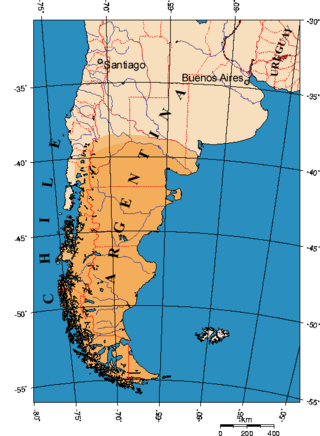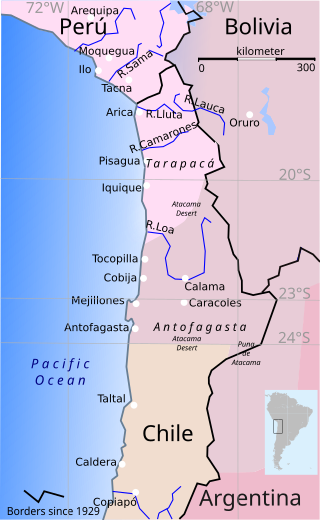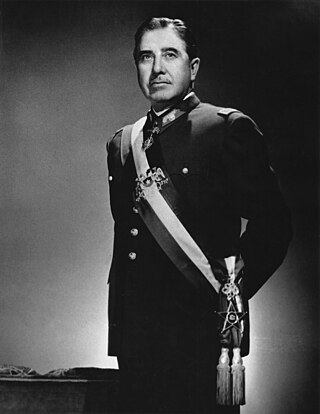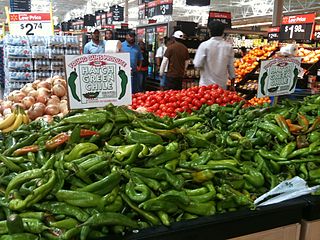| Noctubourgognea coppingeri | |
|---|---|
| Scientific classification | |
| Kingdom: | |
| Phylum: | |
| Class: | |
| Order: | |
| Family: | |
| Genus: | |
| Species: | N. coppingeri |
| Binomial name | |
| Noctubourgognea coppingeri (Butler, 1881) | |
| Synonyms | |
| |
Noctubourgognea coppingeri is a moth of the family Noctuidae. It is found in the Magallanes and Antartica Chilena Region of Chile and Patagonia.
The wingspan is about 40 mm.

Chile, officially the Republic of Chile, is a country located in western South America. It is the southernmost country in the world and the closest to Antarctica, stretching along a narrow strip of land between the Andes Mountains and the Pacific Ocean. With an area of 756,949 square kilometers (292,260 sq mi) and a population of 17.5 million as of 2017, Chile shares borders with Peru to the north, Bolivia to the northeast, Argentina to the east, and the Drake Passage to the south. The country also controls several Pacific islands, including Juan Fernández, Isla Salas y Gómez, Desventuradas, and Easter Island, and claims about 1,250,000 square kilometers (480,000 sq mi) of Antarctica as the Chilean Antarctic Territory. The capital and largest city of Chile is Santiago, and the national language is Spanish.

South America is a continent entirely in the Western Hemisphere and mostly in the Southern Hemisphere, with a relatively small portion in the Northern Hemisphere at the northern tip of the continent. It can also be described as the southern subregion of a single continent called America.

Salvador Guillermo Allende Gossens was a socialist politician, who served as the 28th president of Chile from 1970 until his death in 1973. As a democratic socialist committed to democracy, he has been described as the first Marxist to be elected president in a liberal democracy in Latin America.

Santiago, also known as Santiago de Chile, is the capital and largest city of Chile and one of the largest cities in the Americas. It is located in the country's central valley and is the center of the Santiago Metropolitan Region, which has a population of 7 million, representing 40% of Chile's total population. Most of the city is situated between 500–650 m (1,640–2,133 ft) above sea level.

Patagonia is a geographical region that encompasses the southern end of South America, governed by Argentina and Chile. The region comprises the southern section of the Andes Mountains with lakes, fjords, temperate rainforests, and glaciers in the west and deserts, tablelands and steppes to the east. Patagonia is bounded by the Pacific Ocean on the west, the Atlantic Ocean to the east, and many bodies of water that connect them, such as the Strait of Magellan, the Beagle Channel, and the Drake Passage to the south.

Valparaíso is a major city, commune, seaport, naval base, and educational centre in the Valparaíso Region, Chile.

Chili peppers, from Nahuatl chīlli, are varieties of the berry-fruit of plants from the genus Capsicum, which are members of the nightshade family Solanaceae, cultivated for their pungency. Chili peppers are widely used in many cuisines as a spice to add "heat" to dishes. Capsaicin and related compounds known as capsaicinoids are the substances giving chili peppers their intensity when ingested or applied topically. Chili peppers exhibit a wide range of heat and flavor profiles. This diversity is the reason behind the availability of different types of paprika and chili powder, each offering its distinctive taste and heat level.

The War of the Pacific, also known as the Nitrate War and by multiple other names, was a war between Chile and a Bolivian–Peruvian alliance from 1879 to 1884. Fought over Chilean claims on coastal Bolivian territory in the Atacama Desert, the war ended with a Chilean victory, which gained for the country a significant amount of resource-rich territory from Peru and Bolivia.

The Mapuche is a group of native indigenous inhabitants of south-central Chile and southwestern Argentina, including parts of Patagonia. The collective term refers to a wide-ranging ethnicity composed of various groups who share a common social, religious, and economic structure, as well as a common linguistic heritage as Mapudungun speakers. Their homelands once extended from Aconcagua Valley to the Chiloé Archipelago and later spread eastward to Puelmapu, a land comprising part of the Argentine pampa and Patagonia. Today the collective group makes up over 80% of the indigenous peoples in Chile and about 9% of the total Chilean population. The Mapuche are concentrated in the Araucanía region. Many have migrated from rural areas to the cities of Santiago and Buenos Aires for economic opportunities.

The 1973 Chilean coup d'état was a military overthrow of the Popular Unity government in Chile led by the democratic socialist Salvador Allende as president of Chile. Allende, who has been described as the first Marxist to be democratically elected president in a Latin American liberal democracy, faced significant social unrest, political tension with the opposition-controlled National Congress of Chile, and economic warfare ordered by United States president Richard Nixon. On 11 September 1973, a group of military officers, led by General Augusto Pinochet, seized power in a coup, ending civilian rule. In 2000, the CIA admitted its role in the 1970 kidnapping of René Schneider, who had refused to use the army to stop Allende's inauguration. 2023 declassified documents showed that Nixon, Henry Kissinger, and the United States government, which had branded Allende as a dangerous communist, were aware of the coup and its plans to overthrow Allende's democratically-elected government.

The Chile national football team represents Chile in men's international football competitions and is controlled by the Federación de Fútbol de Chile which was established in 1895. The team is commonly referred to as La Roja. Chile has appeared in nine World Cup tournaments and were hosts of the 1962 FIFA World Cup where they finished in third place, the highest position the country has ever achieved in the World Cup.

The Chilean Navy is the naval warfare service branch of the Chilean Armed Forces. It is under the Ministry of National Defense. Its headquarters are at Edificio Armada de Chile, Valparaiso.

Club Universidad de Chile is a professional football club based in Santiago, Chile, that plays in the Primera División.

Club Deportivo Palestino is a professional football club based in the city of Santiago, Chile. The club was founded in 1920 and plays in the Primera División de Chile. They play their home games at the Estadio Municipal de La Cisterna stadium, which has a capacity of approximately 8,000 seats.

The Chilean Primera División is a professional football league, being the highest division of Chilean football league system. It is organized by the ANFP. The league was previously known as the Campeonato AFP PlanVital for sponsorship reasons. In 2023, the ANFP signed a partnership with Betsson Group to become the official naming sponsor of the competition, which became known as Campeonato Betsson.

Alexis Alejandro Sánchez Sánchez, also known mononymously as Alexis, is a Chilean professional footballer who plays as a forward for Serie A club Inter Milan and the Chile national team. He is often regarded as the greatest Chilean player of all time.

Pablo Neruda was a Chilean poet-diplomat and politician who won the 1971 Nobel Prize in Literature. Neruda became known as a poet when he was 13 years old and wrote in a variety of styles, including surrealist poems, historical epics, political manifestos, a prose autobiography, and passionate love poems such as the ones in his collection Twenty Love Poems and a Song of Despair (1924).

Chileans are an ethnic group and nation native to the country of Chile and its neighboring insular territories. Most Chileans share a common culture, history, ancestry and language. The overwhelming majority of Chileans are the product of varying degrees of admixture between European ethnic groups with peoples indigenous to Chile's modern territory. Chile is a multilingual and multicultural society, but an overwhelming majority of Chileans have Spanish as their first language and either are Christians or have a Christian cultural background.

Augusto José Ramón Pinochet Ugarte was a Chilean general and President of Chile who ruled Chile from 1973 to 1990, first as the leader of the Military Junta of Chile from 1973 to 1981, being declared President of the Republic by the junta in 1974 and becoming the de facto dictator of Chile, and from 1981 to 1990 as de jure president after a new constitution, which confirmed him in the office, was approved by a referendum in 1980. His rule remains the longest of any Chilean leader.

New Mexico chile or New Mexican chile is a cultivar group of the chile pepper from the US state of New Mexico, first grown by Pueblo and Hispano communities throughout Santa Fe de Nuevo México. These landrace chile plants were used to develop the modern New Mexico chile peppers by horticulturist Fabián García and his students, including Roy Nakayama, at what is now New Mexico State University in 1894.